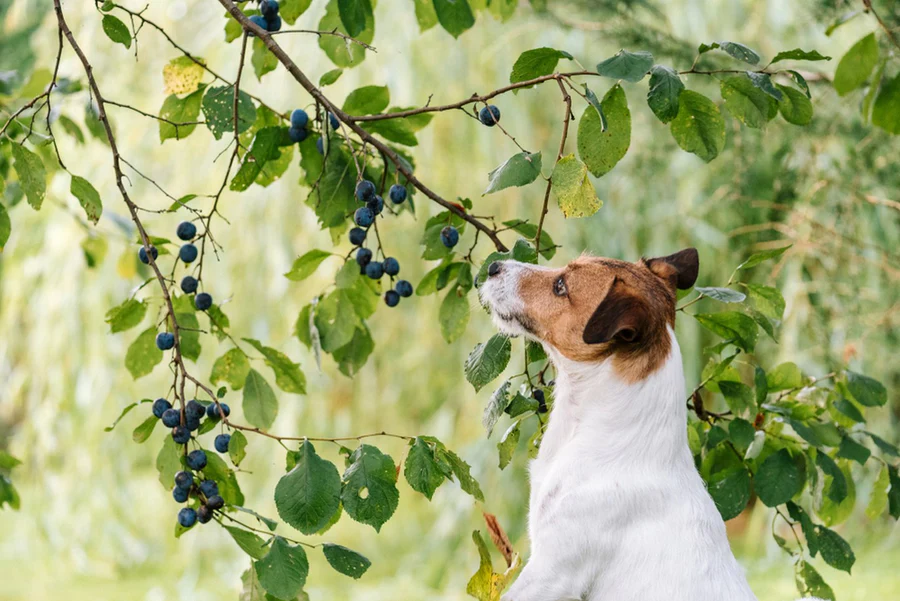
Plum flesh can be a safe treat for dogs in moderation, but there are various risks associated with offering plums to your canine companion. Always consult with your veterinarian before introducing new foods to your dog’s diet.
When you’re enjoying a healthy snack, you might wonder whether you can share it with your furry friend. For instance, is it okay for dogs to eat plums? While some fruits are safe and even beneficial for dogs, plums, although their flesh is consumable in moderation, are generally best avoided due to potential cyanide poisoning, choking hazards, and their high sugar content.
Can Dogs Have Plums?
Dogs can consume plums in moderation, provided that you properly prepare them by removing the stem, seeds, and pit. However, it’s usually not advisable to give plums to your dog, despite a few potential health benefits. When deciding whether to share plums with your dog, always consider the risks and be prepared to monitor your dog for any adverse reactions.
Health Benefits of Plums for Dogs
While there are potential health benefits associated with feeding plums to dogs, there are also risks. Just like with any human food, some are safe, and some are not. For instance, dogs can safely consume cheese in moderation, but grapes should be avoided at all costs.
In the case of plums, their trace amounts of cyanide and the choking hazard presented by their pits make them a risky choice. While the flesh can offer some health benefits, including fiber, vitamins, and hydration, it’s essential to recognize that your dog typically gets all the necessary nutrients from their regular dog food. If your dog requires additional fiber or nutrients, safer alternatives can be explored.
Risks of Feeding Plums to Dogs
Several risks are associated with feeding plums to dogs, and it’s crucial to weigh these against any potential benefits. These risks include:
1. Choking: Plum pits are a significant choking hazard for dogs, as they may attempt to chew or swallow them, leading to potential throat blockages and intestinal obstructions.
2. Sugar Content: Plums, despite having a low glycemic index, contain sugar that can cause spikes in blood sugar levels, posing dangers to dogs, especially those with underlying health issues like obesity and diabetes.
3. Poisoning: While the flesh of the fruit is generally safe for dogs, other parts of the plum plant, such as the pit, stem, and leaves, contain cyanide, making them toxic to dogs. If you have a plum tree in your yard, ensure that your dog cannot access it to prevent potential poisoning.
In conclusion, while the flesh of plums is considered safe for most healthy dogs in moderation, the pit, stem, and leaves pose various risks. There is also a small risk of allergic reactions or digestive issues, especially in dogs with sensitive stomachs. Therefore, it’s generally advisable to avoid sharing plums with your dog and opt for safer fruit alternatives like apples, blueberries, or mangoes.
If you have concerns about your dog’s diet and believe it may not be providing the necessary nutrients for their health, consult your veterinarian to determine the best dog food for your pet.
Plum Pits Are Toxic for Dogs
As mentioned earlier, plum pits are highly toxic to dogs due to the presence of cyanide and other harmful compounds. These toxins can lead to severe symptoms, including shock, making plum poisoning a life-threatening condition.
Signs of Plum Poisoning
While consumption of a small piece of plum flesh is unlikely to cause poisoning, it’s essential to monitor your pet for signs of plum poisoning, which may include:
- Dilated pupils
- Difficulty breathing
- Panting
- Seizures
- Collapse
- Shock
If you suspect your dog has ingested any part of the plum plant other than the flesh, you should immediately seek veterinary assistance. Prompt treatment is critical, as delayed intervention increases the risk of severe consequences, and your dog may require an overnight stay at the vet clinic.
How to Safely Feed Your Dog Plums
If you decide to share plums with your dog, take precautions to prevent poisoning, choking, and obstructions. Here are some tips to ensure safe plum consumption for your dog:
- Wash the plum to remove pesticides, dirt, and germs before feeding it to your dog.
- Always remove the pit from the plum and dispose of it in a secure manner.
- Cut the plum into small, bite-sized pieces to reduce the choking risk.
- Monitor your dog for any adverse reactions, such as digestive issues or signs of allergies.
If your dog experiences vomiting, diarrhea, or other signs of illness after consuming plums, consult your vet for guidance. In the case of suspected poisoning or obstruction, seek immediate veterinary care.
Final Notes
In summary, plums are not considered a recommended or safe treat for dogs due to the associated risks. There are healthier fruits that you can share with your dog without compromising their well-being, such as apples, blueberries, and mangoes. Always consider the potential risks versus benefits when introducing human food to your dog’s diet, and consult your veterinarian for guidance to ensure your pet’s safety and well-being.